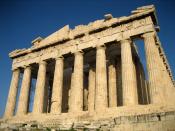Sophocles's Teiresias condemns pride as an evil. In Antigone, pride was an action despised by society and the gods of Greek mythology. Those who were over-prideful were often punished by the gods and were condemned to suffering. Though, pride is both a positive and a negative trait. Pride can be negative if it is arrogant or self-centered. Moderation is a virtue, so being over prideful would constitute an evil. But pride in moderation of integrity and honor is not necessarily a crime.
Pride is not an evil if it is controlled with temperance. People need to be happy with themselves and proud of their achievements. Pride is also a trait that asserts courage and fortitude. In Arthur Miller's The Crucible, John Proctor pride is what saves his integrity. He is charged for witch-craft, yet his pride keeps him from succumbing to the false accusation in order to save his life.
Proctor refuses to tarnish his good name and soul. Self-pride is in this case a source of strength and hope for redemption in the after-life.
Pride can also be a binding force. After the September 11th attacks, the United States felt a surge of national pride. The patriotism and nationalism promoted unity and pride in our country. This common allegiance stands as a positive source of fortitude against the evils of terrorism.
Yet evil becomes present when people are pompous and boastful of themselves. In Greek mythology, pride is what makes people unwilling to accept advice which causes them to act rashly and make bad decisions that will eventually lead to their failure. This idea is true in the mindset of many teenagers today. Mistakes, some of which are fatal, are made out of simple teenage pride.
There is also the situation of a lack of pride. Lacking...


